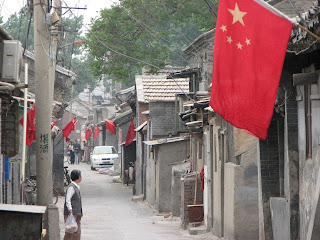After an afternoon of walking around in slums located within blocks of Tiananmen Square — festooned with flags for the national holiday —  I am ever more convinced that the only way to think about China in the early twenty-first century is by drawing upon the Jain parable of the blind men and the elephant.
I am ever more convinced that the only way to think about China in the early twenty-first century is by drawing upon the Jain parable of the blind men and the elephant.
For Japan's neighbors, and, indeed, for the entire international community, there is no generalizing about China. There are no simple answers.
What is one to make of the existence of urine-soaked slums in the heart of Beijing, adjacent to broad avenues packed with European luxury cars and blocks away from crowds of tourists (Chinese and otherwise) carrying the latest digital cameras and snapping pictures of the portrait of Mao overlooking Tiananmen Square? And how about the whitewashing of Chinese history between the founding of the People's Republic in 1949 and the turn of the twenty-first century — and the consequently crass abuse of China's imperial past?
There appears to be no logic to Beijing and little order. Massive commercial and housing developments appear to have fallen from the sky, with nothing but the presence of cranes building similar structures suggesting that the behemoths were the product of human hands. I felt a distinct and omnipresent energy and a materialism unmatched in my experience (dialectical materialism without the dialectical). At the same time that more and more Chinese are following Deng Xiaoping's injunction that "to get rich is glorious," millions of Chinese are turning to religions of ancient or western provenance. It is a society changing in ways that even its one-party rulers are incapable of controlling, try though they might.
How can the US and Japan deal with this bundle of contradictions that is China? China demands a foreign policy approach, especially from the US, that resists the urge to rush to judgment or to cajole. The political change desired by Americans will not happen overnight, and it will not happen because of American prompting. Tokyo, perhaps to an extent greater than Washington, acknowledges that the ability of outside powers to impact the course of political development within China is limited.
Unpleasant as it may seem, this is the China with which the world will have to live for the foreseeable future.
 I am ever more convinced that the only way to think about China in the early twenty-first century is by drawing upon the Jain parable of the blind men and the elephant.
I am ever more convinced that the only way to think about China in the early twenty-first century is by drawing upon the Jain parable of the blind men and the elephant.For Japan's neighbors, and, indeed, for the entire international community, there is no generalizing about China. There are no simple answers.
What is one to make of the existence of urine-soaked slums in the heart of Beijing, adjacent to broad avenues packed with European luxury cars and blocks away from crowds of tourists (Chinese and otherwise) carrying the latest digital cameras and snapping pictures of the portrait of Mao overlooking Tiananmen Square? And how about the whitewashing of Chinese history between the founding of the People's Republic in 1949 and the turn of the twenty-first century — and the consequently crass abuse of China's imperial past?
There appears to be no logic to Beijing and little order. Massive commercial and housing developments appear to have fallen from the sky, with nothing but the presence of cranes building similar structures suggesting that the behemoths were the product of human hands. I felt a distinct and omnipresent energy and a materialism unmatched in my experience (dialectical materialism without the dialectical). At the same time that more and more Chinese are following Deng Xiaoping's injunction that "to get rich is glorious," millions of Chinese are turning to religions of ancient or western provenance. It is a society changing in ways that even its one-party rulers are incapable of controlling, try though they might.
How can the US and Japan deal with this bundle of contradictions that is China? China demands a foreign policy approach, especially from the US, that resists the urge to rush to judgment or to cajole. The political change desired by Americans will not happen overnight, and it will not happen because of American prompting. Tokyo, perhaps to an extent greater than Washington, acknowledges that the ability of outside powers to impact the course of political development within China is limited.
Unpleasant as it may seem, this is the China with which the world will have to live for the foreseeable future.

1 comment:
I agree with your observations and conclusions. Nice work.
Post a Comment